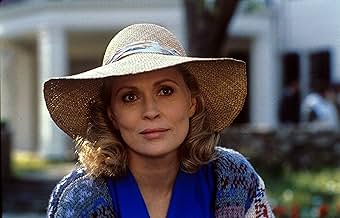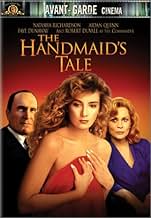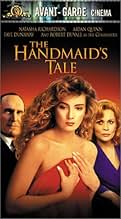IMDb रेटिंग
6.0/10
12 हज़ार
आपकी रेटिंग
अपनी भाषा में प्लॉट जोड़ेंUnder a dystopian religious tyranny, most women cannot conceive children. Those young women who can live in a form of sexual slavery to provide children for influential families.Under a dystopian religious tyranny, most women cannot conceive children. Those young women who can live in a form of sexual slavery to provide children for influential families.Under a dystopian religious tyranny, most women cannot conceive children. Those young women who can live in a form of sexual slavery to provide children for influential families.
- निर्देशक
- लेखक
- स्टार
- पुरस्कार
- 2 जीत और कुल 1 नामांकन
Reiner Schöne
- Luke
- (as Rainer Schoene)
Robert D. Raiford
- Dick
- (as Robert Raiford)
फ़ीचर्ड समीक्षाएं
This movie, based on Margaret Atwood's story, concerns a woman living in the not too distant future in the Republic of Gilead, a country that was once the United States. The country is now run by fundamentalist Christians who have demoted all women to a second class citizenship. Nuclear war has made most women infertile, so the government has forced all the fertile women to serve as handmaids and bear children for the leaders and their infertile wives as part of a biblical prophecy. The infertile women are sent off to toil as slaves and clean up nuclear waste. This movie concerns one handmaid, Offred (Kate) and her struggle to escape Gilead, find her daughter, and flee to Canada. Not a bad movie at all, all the actors do very well. The material just runs very slow at points, and the character's aren't all that well developed.
An unfortunate movie which is definitely more like Harold Pinter's earlier plays than anything Margaret Atwood ever produced. No attempt is made to bring out Atwood's clever social message, and we're all supposed to be shocked at the sexual content. A shame, because Atwood's version might have made a good film.
I'm surprised by some of the negative comments on this film. In my opinion, it represents the best kind of literary adaptation that the cinema offers: One in which the screenwriter and director clearly remained faithful to the spirit of the book without attempting to reproduce it. How can you go wrong with a Margaret Atwood book, a Harold Pinter screenplay and Volker Schlöndorff's direction? Some have suggested that the film suffered from "wooden" acting. Personally, I thought it was a fantastic cast: Robert Duvall and Victoria Tennant at their evil best; Faye Dunnaway as the "defeated" wife; Elizabeth McGovern as saucy as ever; Aidan Quinn and Natascha Richardson in the necessarily bland roles that drive the narrative. What holes here?
Commercial film doesn't get any better. "The Handmaid's Tale" is a dark portrait of a world unlike ours and yet so much like ours... in which a right-wing, bureaucratic patriarchy dominates the land. Women have three main functions (for which their clothing is color coded): Red for the handmaids, who are walking wombs; white for the innnocent children; blue for the sterile trophy wives. Brown is worn by the "aunts", a futuristic equivalent of the Sonderkomando (i.e., Jews who worked on behalf of the Nazi's in the death camps), evil schoolmistress types who both train/brainwash young women for assignment and occasionally destroy them. A fifth function, for which the garb is particularly interesting, is "working" in Gilead's underground social club (essentially a den of iniquity, rife with prostitution and drugs.) Point is... by splitting up these functions, hasn't Atwood described the basic roles that women play within our own male-dominated society, in various different permutations and combinations? To the patriarchy, women are mothers, models, sluts, angels and, when professionals, they are not to aspire to more teaching posts. In Gilead, the lines are clearer; in our own society, aren't most women "supposed to" play some combination of all of these roles?
I get the feeling that most moviegoers are looking for something else in "sci-fi." Here's a new plot twist: The rebels feed Kate some kind of medication that allows her to read the commander's mind while destroying his brain. Wait... that's "Scanners." Oops. Seriously, two of the reviews on this site made spedific mention of Schlöndorff's "horrible", "atrocious" directorial skills. Ahem. Perhaps before they weigh in on the auteur, they ought to see "Young Törless", "Coup de grâce", "The Tin Drum" and all of his other wonderful efforts. As a matter of fact, to insinuate that someone who could bring Grass' Tin Drum to the screen in such a stunning fashion is a lousy director is PREPOSTEROUS. Schlöndorff is a giant of the New German Cinema, and it underscores the ignorance of the Hollywooders when they cast such baseless aspersions.
Commercial film doesn't get any better. "The Handmaid's Tale" is a dark portrait of a world unlike ours and yet so much like ours... in which a right-wing, bureaucratic patriarchy dominates the land. Women have three main functions (for which their clothing is color coded): Red for the handmaids, who are walking wombs; white for the innnocent children; blue for the sterile trophy wives. Brown is worn by the "aunts", a futuristic equivalent of the Sonderkomando (i.e., Jews who worked on behalf of the Nazi's in the death camps), evil schoolmistress types who both train/brainwash young women for assignment and occasionally destroy them. A fifth function, for which the garb is particularly interesting, is "working" in Gilead's underground social club (essentially a den of iniquity, rife with prostitution and drugs.) Point is... by splitting up these functions, hasn't Atwood described the basic roles that women play within our own male-dominated society, in various different permutations and combinations? To the patriarchy, women are mothers, models, sluts, angels and, when professionals, they are not to aspire to more teaching posts. In Gilead, the lines are clearer; in our own society, aren't most women "supposed to" play some combination of all of these roles?
I get the feeling that most moviegoers are looking for something else in "sci-fi." Here's a new plot twist: The rebels feed Kate some kind of medication that allows her to read the commander's mind while destroying his brain. Wait... that's "Scanners." Oops. Seriously, two of the reviews on this site made spedific mention of Schlöndorff's "horrible", "atrocious" directorial skills. Ahem. Perhaps before they weigh in on the auteur, they ought to see "Young Törless", "Coup de grâce", "The Tin Drum" and all of his other wonderful efforts. As a matter of fact, to insinuate that someone who could bring Grass' Tin Drum to the screen in such a stunning fashion is a lousy director is PREPOSTEROUS. Schlöndorff is a giant of the New German Cinema, and it underscores the ignorance of the Hollywooders when they cast such baseless aspersions.
There's nothing subtle about this screen adaptation of Margaret Atwood's cautionary fable, but the premise is nothing if not provocative: in a repressive fundamentalist dictatorship (called Gilead, but ostensibly America in the near future) the few remaining fertile women are forced to bear children, in effect becoming sexual servants to the (male) powers-that-be. Gilead may be colored red, white and blue, but there's more than a passing resemblance to Orwell's Oceana; even the act of conception is reduced to a ritual, with the euphemism 'ceremony' doubling for intercourse. A talented cast does its best with Harold Pinter's typically inscrutable screenplay, but under Volker Schlondorff's dispassionate direction the film never achieves a convincing level of oppression or paranoia. Worse, it lacks a story to match its scenario; the handmaid Offred's redemption is achieved only with the help of another man, which seems to deflate the feminist slant. The final result is nowhere near a successful movie, but never less than a fascinating failure.
This is a nightmare vision of the future. It seems 1 out of every 100 women is fertile (for some reason). The ones who aren't perform slave labor. The ones that are are "sold" off to rich families where they have sex with the husband to produce a baby. Kate (the late and missed Natasha Richardson) is one such servant to Serena Joy (Faye Dunaway) and her husband the Commander (Robert Duvall). Kate wants out--but it seems there's no way.
The synopsis only scratches the surface of a VERY dark and disturbing movie. It slowly shows how women are treated and used and it just gets more horrifying as it unfolds. The parallels to Hitler's Nazi Germany are fairly obvious but here we have barren women instead of Jews and gays. The good acting by everybody makes this hard to shake off. Aidan Quinn (as Nick) and Duvall are OK; Victoria Tennant is chilling as a leader of the camps; Elizabeth McGovern is just great as a fellow prisoner who befriends Kate; Dunaway is also very good in her role. Best of all is Richardson. This couldn't have been an easy role but she pulls it off beautifully. She died at far too young an age. This is basically an unknown movie and it's easy to see why--it's far too dark and disturbing for a general audience. However the ending is (sort of) uplifting (and changed from the book). Grim, dark and depressing. View it at your own risk. The ceremony sequences are almost impossible to watch and shocked the hell out of me the first time I saw this.
The synopsis only scratches the surface of a VERY dark and disturbing movie. It slowly shows how women are treated and used and it just gets more horrifying as it unfolds. The parallels to Hitler's Nazi Germany are fairly obvious but here we have barren women instead of Jews and gays. The good acting by everybody makes this hard to shake off. Aidan Quinn (as Nick) and Duvall are OK; Victoria Tennant is chilling as a leader of the camps; Elizabeth McGovern is just great as a fellow prisoner who befriends Kate; Dunaway is also very good in her role. Best of all is Richardson. This couldn't have been an easy role but she pulls it off beautifully. She died at far too young an age. This is basically an unknown movie and it's easy to see why--it's far too dark and disturbing for a general audience. However the ending is (sort of) uplifting (and changed from the book). Grim, dark and depressing. View it at your own risk. The ceremony sequences are almost impossible to watch and shocked the hell out of me the first time I saw this.
क्या आपको पता है
- ट्रिवियाWhile working on the film, Robert Duvall became so fascinated with evangelism that it inspired him to write The Apostle (1997).
- गूफ़When Moira ties up Aunt Lydia and escapes the Red Center, it is late at night, but moments later, when she exits, it is clearly daytime.
- साउंडट्रैकWhispering Hope
Written by Septimus Winner as Alice Hawthorne
टॉप पसंद
रेटिंग देने के लिए साइन-इन करें और वैयक्तिकृत सुझावों के लिए वॉचलिस्ट करें
- How long is The Handmaid's Tale?Alexa द्वारा संचालित
विवरण
- रिलीज़ की तारीख़
- कंट्री ऑफ़ ओरिजिन
- आधिकारिक साइट
- भाषा
- इस रूप में भी जाना जाता है
- El cuento de la doncella
- फ़िल्माने की जगहें
- James Adams Buchanan House, 1810 Cedar St, डरहम, उत्तरी कैरोलिना, संयुक्त राज्य अमेरिका(Commander Fred's house)
- उत्पादन कंपनियां
- IMDbPro पर और कंपनी क्रेडिट देखें
बॉक्स ऑफ़िस
- US और कनाडा में सकल
- $49,60,385
- US और कनाडा में पहले सप्ताह में कुल कमाई
- $7,38,578
- 11 मार्च 1990
- दुनिया भर में सकल
- $49,60,385
- चलने की अवधि
- 1 घं 49 मि(109 min)
- रंग
- ध्वनि मिश्रण
- पक्ष अनुपात
- 1.85 : 1
इस पेज में योगदान दें
किसी बदलाव का सुझाव दें या अनुपलब्ध कॉन्टेंट जोड़ें








































